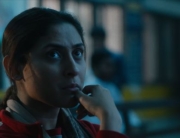Set in the working-class estates of East London, Charlotte Regan’s feature debut centers on a 12-year-old girl, Georgie, who is living alone after her mother’s passing. She is an independent and resourceful 12-year-old, stealing bikes with her friend Ali to support herself. She keeps memories of her mother alive by maintaining the house exactly the same. All the while, she dodges social services as she has kept her mother’s death a secret.
Georgie is in for a big surprise, though, when her father, Jason, shows up out of the blue, needing a place to stay. He left when Georgie was still a baby; he did not want the responsibility of being a father. The film revolves around their relationship and how they both adjust to a new normal they did not expect: Georgie is a young girl who has grown up too fast, whereas Jason still has a lot of growing up to do.
In many ways, the drama/comedy pays homage to the British New Wave cinema of the 1960s. This is reflected primarily in the documentary-style cinematography by Molly Manning Walker. Authenticity is vital to this film and is evident in the casting, locations, and even costuming. Regan and her team searched for a non-professional actor for Georgie’s role within the same communities they wanted to depict, and used locals as extras and background actors.
Most of all, Scrapper pays attention to the little details, such as Georgie’s retro West Ham United jersey. Historically, West Ham supporters have been known to working-class hailing from the East London area, and these touches elevate the film. Scrapper also features an eclectic soundtrack with different genres of music weaving in and out. (The wide range of music also reflects Regan’s career as an established music video director.)
Reading this review, you may think of Scrapper as a quintessential working-class film that audiences have come to expect from independent British filmmakers like Ken Loach. And while it is undoubtedly inspired by the kitchen sink drama, it has a unique charm that is not often seen in the genre. Regan chooses to subvert expectations by injecting magical realism, all springing from Georgie’s imagination. Whimsical sequences featuring over-the-top cutaways, talking-head interviews, and even a quirky scene depicting talking spiders give us an insight into Georgie’s mind. The juxtaposition between working-class life and a child’s imagination creates a compelling narrative, and also highlights Regan’s unique perspective and filmmaking style.
Lola Campbell, who plays Georgie, debuted in this film along with Alin Uzun, who plays her best friend Ali. They are joined by BAFTA-nominated actor Harris Dickinson, as Georgie’s father, Jason. The chemistry between their characters is the film’s backbone, and the dialogue/improvisation is a comedic highlight.
This coming-of-age tale feels reminiscent of Taika Waititi’s Hunt for the Wilderpeople. But Scrapper is unique because it is much more grounded in its setting. Regan’s blend of genres creates a vibrant and realistic portrayal of a young girl forced to grow up too soon.







Leave A Comment